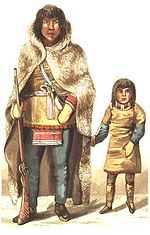Akaitcho
| Chief Akaitcho | |
|---|---|

Portrait of Chief Akaitcho and his only son, by Robert Hood.
|
|
| Born | ca. 1786 |
| Died | Spring 1838 |
| Resting place | An island in Great Slave Lake's Yellowknife Bay |
| Other names | "Big-Foot", or "Big-Feet" |
| Known for | Chief of the Yellowknives |
| Relatives | François Beaulieu, brother-in-law |
Akaitcho (variants: Akaicho or Ekeicho; translation: "Big-Foot" or "Big-Feet"; meaning: "like a wolf with big paws, he can travel long distances over snow") (ca. 1786-1838) was a Copper Indian, and Chief of the Yellowknives. His territory included the region from the eastern portion of the Great Slave Lake, in the Northwest Territories, Canada, to the Coppermine River, in Nunavut. He was recruited to act as interpreter, guide, and hunter for John Franklin's first of three Arctic expeditions, the Coppermine Expedition of 1819–1822.
Akaitcho was considered a man "of great penetration and shrewdness" and an aggressive leader. His tribe, who spoke their own dialect, consisted of the northwesternmost Chipewyan people. They traded meat supplies to the North West Company's Fort Providence trading post, situated on the East Arm of the Great Slave Lake. They were also known for pillaging, stealing women, and killing Dogrib and Hare Indians.
In 1820, when his tribe numbered about 190, Akaitcho and his men, including Akaitcho's brothers, Humpy and White Capot, were recruited by the North West Company to serve as guides and hunters for a Royal Navy expedition, a search for the Northwest Passage. Besides Franklin, the expeditionary group consisted of John Richardson, doctor and naturalist, Midshipmen Robert Hood and George Back, and Ordinary Seaman John Hepburn. They met at Fort Providence, on the north side of the lake, in July. Akaitcho's terms included cancellation of his tribe's debts to the North West Company, plus provisions of cloth, ammunition, tobacco, and iron products. In return, his men would hunt and guide for the expedition during its north-bound journey on the Coppermine River, and they would leave food supplies for Franklin's return. But Akaitcho warned Franklin that food would not always be available. They reached the winter encampment of Fort Enterprise on Winter Lake, named by Franklin and chosen by Akaitcho, with food supplies running short and Franklin's men losing faith in him; it would be several months before weather would permit them to continue their travels.
...
Wikipedia
